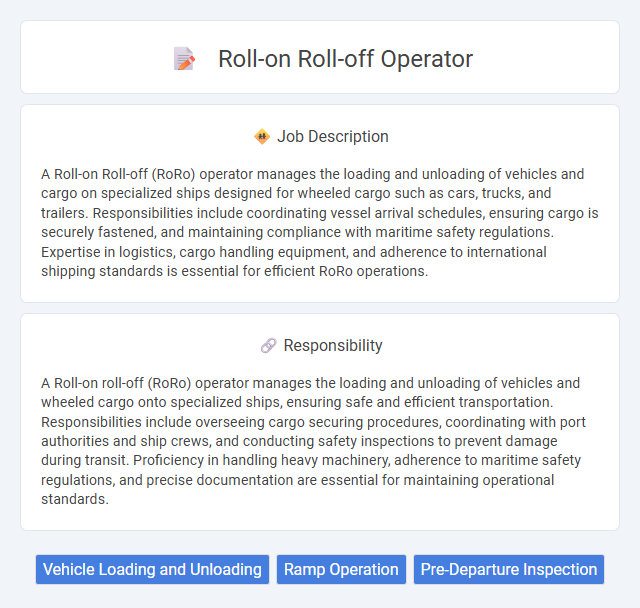
A Roll-on Roll-off (RoRo) operator manages the loading and unloading of vehicles and cargo on specialized ships designed for wheeled cargo such as cars, trucks, and trailers. Responsibilities include coordinating vessel arrival schedules, ensuring cargo is securely fastened, and maintaining compliance with maritime safety regulations. Expertise in logistics, cargo handling equipment, and adherence to international shipping standards is essential for efficient RoRo operations.
Individuals with strong physical stamina and the ability to work in challenging environments may be well-suited for a roll-on roll-off operator role. Those comfortable with operating heavy machinery and following strict safety protocols are likely to adapt effectively. However, people prone to motion sickness or with limited mechanical skills might find the job demanding and less suitable.
Qualification
A Roll-on Roll-off (Ro-Ro) operator must possess a commercial driver's license (CDL) with appropriate endorsements for heavy vehicle operation and experience in maneuvering large vehicles on and off vessels. Strong knowledge of maritime safety regulations and cargo handling procedures is essential to ensure efficient and secure loading and unloading processes. Physical stamina, attention to detail, and excellent spatial awareness contribute significantly to successful Ro-Ro operations.
Responsibility
A Roll-on roll-off (RoRo) operator manages the loading and unloading of vehicles and wheeled cargo onto specialized ships, ensuring safe and efficient transportation. Responsibilities include overseeing cargo securing procedures, coordinating with port authorities and ship crews, and conducting safety inspections to prevent damage during transit. Proficiency in handling heavy machinery, adherence to maritime safety regulations, and precise documentation are essential for maintaining operational standards.
Benefit
A Roll-on roll-off operator job likely offers benefits such as competitive wages and consistent work schedules due to the steady demand for cargo transportation. Workers may probably receive health insurance and retirement plans as part of their employment package. Opportunities for overtime pay and skill development could further enhance the overall compensation and career growth potential in this role.
Challenge
A Roll-on Roll-off operator likely faces the challenge of ensuring the safe and efficient loading and unloading of vehicles and cargo in a dynamic maritime environment. Navigating tight schedules and managing heavy machinery under unpredictable weather conditions may require high levels of precision and adaptability. Potential safety hazards and the need for strict adherence to regulations probably add complexity to the operational responsibilities.
Career Advancement
A Roll-on Roll-off (RoRo) operator manages the loading and unloading of vehicles and cargo on specialized ships, ensuring safety and efficiency in maritime logistics. Career advancement opportunities include progressing to supervisory roles such as lead operator, terminal manager, or logistics coordinator, often requiring additional certifications in safety and maritime operations. Expertise in cargo handling technology and regulatory compliance significantly enhances promotion prospects within the shipping and port management industries.
Key Terms
Vehicle Loading and Unloading
A Roll-on Roll-off (Ro-Ro) operator specializes in the precise vehicle loading and unloading process, ensuring safe and efficient movement of cars, trucks, and heavy machinery onto and off ships via ramps. Expertise in vehicle maneuvering, securing cargo, and adhering to maritime safety protocols minimizes damage risk and optimizes turnaround time. Proficiency in coordinating with port authorities and supervising dock operations enhances logistical flow, supporting seamless transport across sea routes.
Ramp Operation
Ramp operation in roll-on roll-off (RoRo) job involves the efficient management of vehicle loading and unloading on vessels, ensuring safety and speed. Operators coordinate the movement of cars, trucks, and heavy machinery between the dock and ship ramps, optimizing turnaround times. Expertise in heavy equipment handling and strict adherence to safety protocols are critical for effective ramp operations.
Pre-Departure Inspection
Roll-on roll-off (RoRo) operators conduct thorough pre-departure inspections to ensure vessel safety and cargo security. This process includes checking the integrity of ramps, securing mechanisms, and verifying that vehicles and cargo are properly stowed to prevent shifting during transit. Comprehensive inspections minimize operational risks and comply with maritime safety regulations.
 kuljobs.com
kuljobs.com